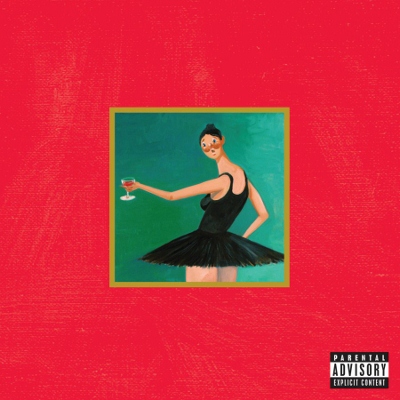
Kanye West, My Beautiful Dark Twisted Fantasy
Def Jam
To understand why My Beautiful Dark Twisted Fantasy earns its title, sounds both sensuously epic and a bit of a dick joke, and manages to combine deep melancholy and triumphant hubris into a stunningly intense experience, let’s backtrack to Kanye West’s debut, 2003’s The College Dropout. On “Never Let Me Down,†Kanye multi-tracked John Legend and Tracie Spencer’s backing vocals into a full-blown gospel chorus as he ruminated on how his parents participated in lunch counter sit-ins during the civil rights movement, and how that legacy made him different. “Niggas can’t make it to ballots to choose leadership/ But we can make it to Jacob’s and to the dealership/ That’s why I hear new music and I just don’t be feeling it,†he rapped. Matched against Kanye’s earnestness, Jay-Z’s Cristal-stained boasts were woefully out of place.
Seven years later, Kanye has become another errant choir boy. His religious upbringing and Black History Month studies help him make outrageous claims of being a pharaoh, a deity similar to Allah himself. “Malcolm West had the whole nation standing at attention,†he claims on “Power.†He speaks about light-skinned girls as if they were new Bentleys to be licked and humped. (Cue R. Kelly’s “You Remind of My Jeep.â€) And suddenly, Jay Hova himself sounds right at home. He murders “Monster.†Even Rick Ross, who repeats his familiar shtick of personifying big-balling hustlers on “Devil in a New Dress,†is apropos to this tall tale of adult children lost in a world of designer clothes, luxury vehicles and scantily-clad women, with TMZ and Gawker keeping score. Brilliantly, Kanye couches these fantasies in a hip-hop context. By inviting the aforementioned plus the RZA, Pusha T, Swizz Beatz, Raekwon and Kid Cudi, he demonstrates that materialism and hubris are essential to understanding hip-hop culture as it is lived, if not necessarily how Kool Herc and Afrika Bambaataa first envisioned it. As Pusha T says on “Runaway,†“I’m just young, rich and tasteless.â€
Nicki Minaj shows up on “Monster†as well, and for “Dark Fantasy,†she playfully impersonating a wide-eyed British schoolgirl spouting Hogwarts cadences. Still, My Beautiful Dark Twisted Fantasy is an Alpha male’s vision of social mores and sexuality. On “Blame Game,†Kanye retraces the loneliness and despair of his last album, 2008’s 808s and Heartbreak, but this time his sadness has turned to bitterness. “Been a long time since I spoke to you/ In the bathroom gripping you up, fucking and choking you,†he raps before transmuting his voice into an angry growl a la Prince’s “Bob George.†John Legend chimes in with the chorus, “I’ll call you bitch for short,†and Chris Rock ends it by impersonating the new boyfriend of Kanye’s ex, and delivers a minutes-long appreciation of Kanye’s “training†skills. Only the end of “Runaway†beats “Blame Game†in self-indulgence, thanks to Kanye collapsing his “toast for the douchebags†refrain into an Auto-Tuned crying jag. Our little “Monster†seemingly can’t handle real emotional pain. He’s much better at ogling the “American Apparel girl†in “Gorgeous.â€
Kanye supports his sexist overtures with perhaps his finest rap performance to date. It’s thrilling to hear him rip through “Gorgeous†with scientific precision: “This pimp is at the top of Mount Olympus/ Ready for the world’s games, this is my Olympics/ We make ‘em say ‘ho’ because the game’s so pimpish.†But, as always, his conscience re-emerges, and he wavers. “What’s a black Beatle anyway, a fucking roach?†he asks, seemingly retreating from stadium rock greatness. Then, tellingly, he sloughs off his ambitions with another lament. “It’s been a while since I watched the tube/ ‘Cause like a Crip said, I got way too many blues for some more bad news.â€
My Beautiful Dark Twisted Fantasy may be an angry and conflicted work, yet it pales next to 50 Cent at his most brutishly cutthroat, Jay-Z at his most cunningly precise, or Scarface at his most laconic and murderous. Kanye will always lose in the hardcore sweepstakes. He is doomed to play Hamlet, a prince too despondent to assume his place on the throne. My Beautiful Dark Twisted Fantasy’s coda is “Lost in the World,†and it’s eerily reminiscent of Stevie Wonder’s “Another Star.†“Let’s break out of this wack-ass party and turn it into a classic night/ If we die in each other’s arms, we’ll get laid in the afterlife.†It’s not the first time Kanye brings up the subject of death; on “Power,†he ends by saying, “This would be a beautiful death/ I’m jumping out the window/ And letting everything go.â€
Near its end, “Lost in the World†drifts into a lengthy excerpt from Gil Scott-Heron’s 1960s spoken-word piece “Comment #1,†re-titled here as “Who Will Survive in America?†Scott-Heron rails in bravely didactic fashion against our country’s bloody history, and our hypocrisy towards personal freedom and democratic ideals. The piece’s inclusion leads to the question of why Kanye would eschew revolutionary suicide for a career of nouveau riche celebrity and petty rituals of conspicuous consumption. But don’t we all want to be young and rich? My Beautiful Dark Twisted Fantasy may tally the high price of fame, but most of us would gladly pay it.
—————————
This essay was posted November 22 on the Rhapsody SoundBoard blog.

